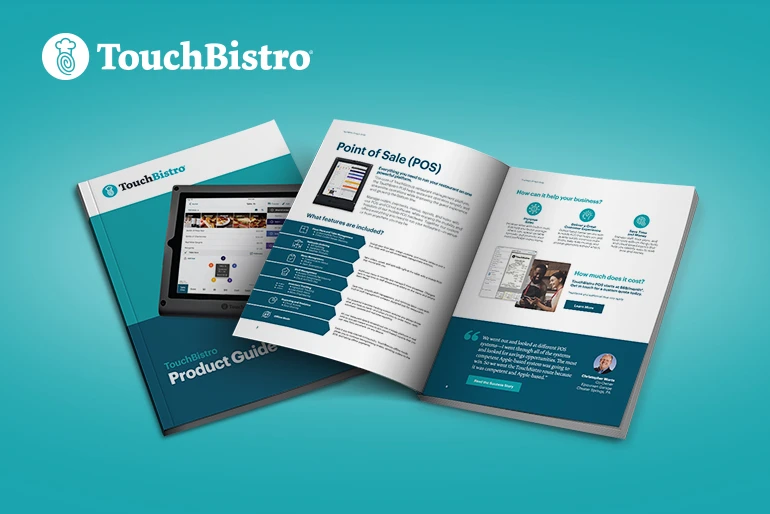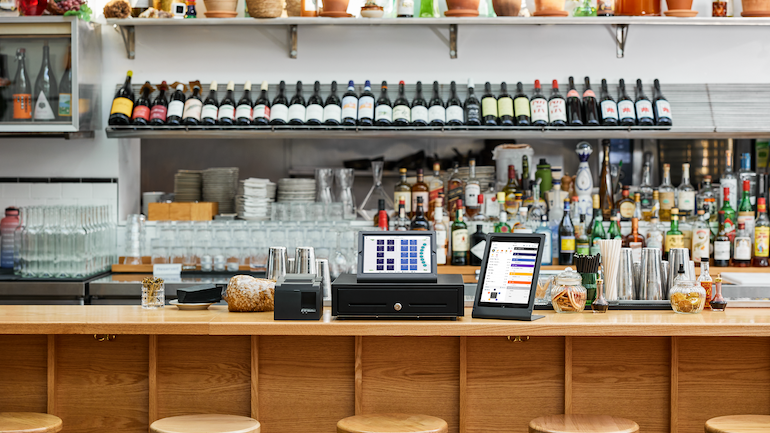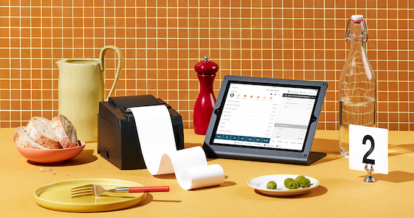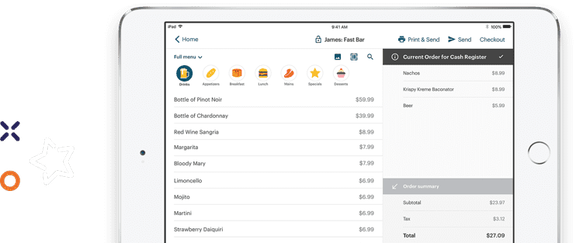Are you looking into TouchBistro competitors? We’ve extensively researched half a dozen TouchBistro alternatives and read many a TouchBistro review so all you have to do is decide which POS system is best for your restaurant. Keep reading to learn how TouchBistro compares to:
- Square
- Clover
- Lightspeed
- SpotOn
- Toast
- Aloha

Compare the top restaurant POS systems on features, pricing, payments, and more.
How TouchBistro Compares to Other Restaurant POS System
Even with lots of players in the market, TouchBistro is among the best restaurant POS systems and stands out as a leader in cloud-based technology. TouchBistro was built specifically for restaurants, by restaurant people. It’s also made to serve all types of concepts thanks to its diverse suite of add-on solutions, such as loyalty, reservations, gift cards, inventory, and back office management.
TouchBistro has spent the last decade perfecting its POS system with updates and features that help operators increase sales, delight customers, and save time and money. This cloud-based POS allows your restaurant to operate nimbly, while safeguards like offline mode help you keep running no matter what.
Why Restaurants Choose TouchBistro Over TouchBistro Competitors
Here’s why restaurant operators are choosing TouchBistro instead of other cloud-based POS systems, according to TouchBistro POS reviews.
Designed Exclusively for Restaurants
Unlike the competition, the TouchBistro POS system has always been designed exclusively for restaurants. In contrast, many TouchBistro alternatives began as retail POS systems and have only introduced restaurant-specific features in recent years.
In short, TouchBistro was created by restaurant industry veterans for restaurateurs. TouchBistro’s POS has served the hospitality sector for more than a decade and is uniquely equipped to meet the needs of restaurant owners, managers, servers, and cooks – something that cannot be said for all other POS providers.
All-in-One Solution
TouchBistro also stands out from the competition because it offers everything you need to run your restaurant all in one place, without a complicated web of third-party integrations. You can start with the TouchBistro POS and opt into native add-on solutions for inventory, back office management, loyalty, online ordering, reservations, and more, as you need them.
Other POS systems make you rely mostly on app marketplaces or third-party integrations, which make for a disjointed experience that can complicate day-to-day operations. Multiple solutions also mean you’ll have different interfaces to work with, which can slow down staff training. And if something goes wrong with an integration, you’ll have to contact each individual partner, rather than calling just one party for support. Not to mention, if you experience syncing issues, you could lose your precious data.

Learn more about the different restaurant management solutions TouchBistro has to offer in this complete product guide.
User-Friendly
Another winning feature of TouchBistro is its user-friendly interface. TouchBistro software runs on best-in-class Apple iPad hardware that’s easy to use and easy to train staff on. Because TouchBistro is made for restaurateurs by restaurateurs, its interface is designed to be intuitive for all staff members – from managers to chefs. Plus, because many people have experience using iPads and iPhones in their personal and professional lives, it’s much easier to train staff on TouchBistro’s iOS-based software than on the kinds of proprietary hardware that other POS systems run on.
Small Business Support
While large, public POS companies, like Toast, have to make decisions in the interests of shareholders, privately held companies like TouchBistro are able to ensure people always come before profits. For example, TouchBistro is more likely to invest in a new feature that customers have been asking for – which takes a long time to develop – than a private company would, because shareholders are looking for much more immediate returns on their investments.
TouchBistro is also first and foremost a restaurant POS company, so all of its efforts go into developing those better solutions for restaurants specifically. In contrast, some POS companies, like SkyTab, are owned by payment processors and are therefore incentivized to put payment processing profits before their customers. This means SkyTab could raise payment processing rates at any time, or create unfavorable terms simply to make some extra money.
The bottom line: customers are TouchBistro’s top priority.
Built for Growth
From multi-location management features to powerful add-on solutions, TouchBistro’s system is flexible enough to grow and scale right alongside your business. As you grow your restaurant empire from your first venue to five (or fifteen) locations, you’ll be able to bulk update menus, access multi-venue reporting, and manage employee permissions across all your locations, all within the TouchBistro platform.
While TouchBistro competitors like Clover and Square offer some multi-location management features, these features take a backseat to the single-unit capabilities that they’re known for. And, although Lightspeed and SpotOn are better for multi-location businesses, the limited native add-on solutions these platforms offer mean you have to rely on third-party integrations, which can result in data loss and complicated workarounds.

Best TouchBistro Alternatives According to Third-Party TouchBistro Reviews
No POS system is one-size-fits-all, which is why we gathered some TouchBistro competitors that might work better for certain restaurants, according to the top third-party review sites.

Compare the top restaurant POS systems on features, pricing, payments, and more.
Best TouchBistro Alternative for Small-Sized Restaurants
Third-party review sites rank Clover and Square among the top POS solutions for single-unit restaurants. Here’s how TouchBistro compares to these competitors when it comes to petite foodservice businesses.
TouchBistro vs. Square
First up in our head-to-head comparison is TouchBistro vs Square. Square has cultivated a reputation as the go-to solution for scrappy entrepreneurs by serving small, nimble operations like food trucks, pop-up restaurants, food halls, and kiosks. While it’s great to have a niche, this focus on small, solo operations means that Square’s new multi-location management platform lacks many of the essential features that today’s operators need to scale. Conversely, TouchBistro is designed to serve restaurants big and small – while helping them grow.
Small foodservice businesses aren’t Square’s only customers. Square’s diverse merchant base also includes retailers, beauty salons, barbershops, and fitness studios. This lack of commitment to one industry means Square spends less time building and improving solutions specifically for restaurants. Unlike Square, TouchBistro is built specifically to serve restaurants and only restaurants.
Finally, while Square has solutions for the restaurant sector, the company is first and foremost a payment processor. Everything from Square’s pricing models to its new small business loan offering has been designed with the sole purpose of growing the company’s payment processing revenue, making it very clear where the company’s top priorities lie. TouchBistro, on the other hand, partners with trusted financial institutions for payment processing so it can keep its own focus on building best-in-class technology for restaurants.
TouchBistro vs. Clover
Similar to Square, Clover is a payments company that offers a POS system, rather than a POS system that offers payment processing services, like TouchBistro does. This means that Clover’s top priority is doing whatever it takes to boost payment processing revenue, rather than making product improvements that benefit customers.
Also similar to Square, retail businesses are Clover’s primary focus, while TouchBistro was built for restaurant people by restaurant people. Without a laser focus on the hospitality industry, there’s no guarantee that Clover will invest an equal amount of resources into its restaurant offerings.
Multi-location management is one of the capabilities that Clover hasn’t invested nearly enough into. Clover may hinder your growth because it’s primarily built for single-location businesses. In contrast, TouchBistro’s POS is equipped with robust multi-location management features that allow you to scale your venture.
Clover’s POS is also limiting because it is equipped with fairly basic functions. If you want to expand the capabilities of the core POS, you’ll need to look for add-on solutions from Clover’s marketplace or via third-party integrations, which creates a fragmented user experience and complicates training. On the contrary, TouchBistro is truly an all-in-one solution that provides you with more tools via native add-ons.
Another reason Clover may not be the right fit for many restaurants is that the system can be difficult for staff to learn, due to the use of proprietary hardware. Unfamiliar and unintuitive devices, like proprietary Android tablets, require longer onboarding, which can be costly for restaurants. In addition to the training challenges it poses, Clover’s technology is also expensive to purchase and replace. TouchBistro runs on iPads, which are accessible, affordable, familiar, and, according to a TouchBistro review, easy to learn. When it comes to comparing TouchBistro vs Clover it’s clear that TouchBistro is the better option for the vast majority of restaurants.

Compare the top restaurant POS systems on features, pricing, payments, and more.
Best TouchBistro Alternative for Medium and Large-Sized Restaurants
If you’re running a larger operation, you might want to consider Lightspeed and SpotOn as alternatives to TouchBistro POS. Here’s the scoop on how those systems stack up to TouchBistro.
TouchBistro vs. Lightspeed
While TouchBistro has been dedicated to restaurants since its inception, Lightspeed served as a retail and ecommerce POS for almost a decade before introducing features for restaurants. And while Lightspeed does now serve many restaurants, the company is constantly expanding into new industries, like golf courses, which stretches its resources and support team thin, while also hindering restaurant-specific product improvements. Thanks to its exclusive focus on the hospitality industry, TouchBistro has the time, energy, and resources to constantly improve its offerings for restaurants.
One way that TouchBistro shows its dedication to restaurants is by developing native add-on solutions – such those for reservations and back office management – that are critical to the industry. Lightspeed, on the other hand, shows that its priorities lie with its other customers. This TouchBistro competitor lacks a native reservations, for example. While Lightspeed customers can use third-party integrations for bookings, these systems sometimes charge per cover and don’t give you access to your booking data. In the TouchBistro vs Lightspeed battle, TouchBistro Reservations gives TouchBistro a boost by charging a flat, predictable fee and letting you use customer data to drive return visits.
And if you’re driving return visits during major holidays and your Lightspeed POS system glitches, you may not be able to access support. Though Lightspeed offers 24/7 support, this coverage is unavailable during major holidays. So if you happen to need help during a holiday like Thanksgiving or New Year’s Eve, you could experience major revenue loss and tarnish your customers’ experience.
TouchBistro vs. SpotOn
Like Lightspeed, SpotOn caters to the needs of many industries: from auto repair shops and beauty salons to stadiums and professional service providers. This diversity in clientele means the company has less time to build and improve solutions specifically for restaurants. On the contrary, TouchBistro serves only restaurants, all of the time.
One way that TouchBistro puts restaurants first is by designing its software to run on iPads, which nearly everyone has experience with. Unfortunately, SpotOn’s POS software runs on proprietary Windows hardware, which is expensive, difficult to source, and takes a long time to learn how to use.
Another point against SpotOn in the TouchBistro vs SpotOn debate is that SpotOn relies heavily on third-party integrations to bridge the gap between its limited in-house products and restaurants’ needs, leading to a complicated user experience. TouchBistro, on the other hand, offers native tools for the front of house, back of house, and guest engagement, making it a complete restaurant management solution, all housed on a single platform.
Finally, although SpotOn advertises “totally transparent pricing,” fuzzy contract details and a unique payment method give the company too much access to merchant payment processing accounts, which it has a history of abusing. Customers often get charged twice, which leads to costly chargeback fees for merchants. If you’re looking for actual transparency, TouchBistro is the obvious choice.

Compare the top restaurant POS systems on features, pricing, payments, and more.
Best TouchBistro Alternative for Multi-Unit Restaurants
If you’re growing your restaurant empire, you won’t want to miss our TouchBistro vs Toast and Aloha comparisons.
TouchBistro vs. Toast
The first thing you should know about Toast is that it’s a publicly traded company. While public companies typically have a lot of funding to play with, their decisions are largely made in the interest of their shareholders, rather than their customers. This means that Toast might prioritize making cheap, quick product updates that generate profits immediately, instead of investing in new products that would greatly help customers, but that could cost more to make without an immediate return. As a privately held company, TouchBistro has its customers’ interests at heart.
Another thing to note about Toast is that its software runs on proprietary Android hardware, which is expensive, difficult to obtain, and complicated to learn to use. As you already know, TouchBistro’s software runs on iPads, which are intuitive, abundant, and accessible.
Hardware isn’t the only thing that’s complicated about Toast. Its convoluted terms can lead to abrupt pricing changes, so there’s no guarantee that your rates will stay fair and equitable. For example, in 2023 Toast introduced a $0.99 fee that merchants’ customers had to pay if their online orders cost less than $10. After outcries from merchants and customers, Toast abruptly removed the fee, giving everyone whiplash. With TouchBistro’s transparent terms, competitive rates, and lack of junk fees, you can rest easy knowing you (and your customers) won’t encounter any surprises.
TouchBistro vs. Aloha
If you’re running an international restaurant chain or franchise with very specialized needs, Aloha’s enterprise solutions could be what you’re looking for. However, if you’re in charge of a single or multi-location restaurant that’s rapidly expanding, TouchBistro may be a better fit for your needs.
Why? First of all, Aloha is a legacy POS solution with slow-moving product development. While it may have been an industry leader in the past, it can’t keep up with an innovative, all-in-one POS and restaurant management systems like TouchBistro.
Another way that Aloha hinders growth and stays behind the times is by using proprietary hardware that’s expensive to source and complicated to learn. TouchBistro runs on iOS and Apple iPads, which are more affordable and nearly everyone is familiar with.
Finally, Aloha’s limited customer service and technical support hours can lead to customer and revenue loss. TouchBistro knows that the restaurant industry needs all hands on deck at all times, which is why it offers support 24/7/365.

Learn more about the different restaurant management solutions TouchBistro has to offer in this complete product guide.

Top 5 Alternatives to TouchBistro POS
From consistent customer support and transparent pricing to its dedication to the restaurant industry, TouchBistro POS is a clear favorite of foodservice operators. If you’re still researching TouchBistro competitors, here’s a summary of what TouchBistro reviews say about the alternatives.
Square
Square is a great starter POS for small, single-unit operations that don’t have their sights set on growth. The system’s portability makes it most suitable for food trucks, pop-ups, and food halls. However, unlike TouchBistro, which promotes growth by letting you add solutions as you need them, Square limits expansion due to its basic features.
Lightspeed
Just like TouchBistro, Lightspeed runs on a user-friendly iOS system. Because Lightspeed also serves retail clients, this POS could be a good option for restaurants that also have a retail component, such as a brewery that sells bottles and merch to go. However, Lightspeed’s lack of laser focus on restaurants leaves the platform lacking when it comes to the kinds of solutions that restaurateurs truly want, like reservations and back office management.
Toast
Toast is one of the few POS systems that shares TouchBistro’s dedication to only serving restaurants. Unlike TouchBistro, however, Toast is publicly traded, which means shareholders and profits are the priorities and customers’ needs come second. Toast also runs on proprietary Android hardware that is expensive to acquire and difficult to learn to use, which can throw a wrench in daily operations
Aloha
Aloha is a good option for large, international chain restaurants. However, because it mostly relies on proprietary hardware installed on-site in your venues, you’ll need to wait for an on-site technician if your system is damaged or needs an update. In contrast, if you ever encounter issues with TouchBistro, you can troubleshoot instantly with the help of round-the-clock remote support.
Clover
Like Lighstpeed, Clover is a solid solution for restaurants with a retail component. However, its limited multi-location capabilities can get in the way of expansion. TouchBistro, on the other hand, is a robust multi-location POS. Furthermore, Clover is a payment processing company that happens to also sell a POS system, while TouchBistro is first and foremost a POS company.
—
If you’re looking for the best restaurant POS system, stop looking for TouchBistro competitors. TouchBistro is the only true all-in-one cloud based POS system created just for restaurants.
If you need to read more TouchBistro POS reviews, check out our POS comparison guide and multi-location POS comparison guide.






